- Home
- Ellen Datlow
Blood Is Not Enough
Blood Is Not Enough Read online
Blood Is Not Enough
Stories of Vampirism
Edited by Ellen Datlow
For my parents
CONTENTS
Introduction
Ellen Datlow
Carrion Comfort
Dan Simmons
The Sea Was Wet as Wet Could Be
Gahan Wilson
The Silver Collar
Garry Kilworth
Try a Dull Knife
Harlan Ellison®.
Varicose Worms
Scott Baker
Lazarus
Leonid Andreyev
L’Chaim!
Harvey Jacobs
Return of the Dust Vampires
S.N. Dyer
Good Kids
Edward Bryant
The Girl with the Hungry Eyes
Fritz Leiber
The Janfia Tree
Tanith Lee
A Child of Darkness
Susan Casper
Nocturne
Steve Rasnic Tem
Down Among the Dead Men
Gardner Dozois and Jack Dann
… To Feel Another’s Woe
Chet Williamson
Time Lapse
Joe Haldeman
Dirty Work
Pat Cadigan
Contributors’ Notes
Acknowledgments
A Biography of Ellen Datlow
INTRODUCTION
As an adolescent I was fascinated by the Dracula movies with the exotic Bela Lugosi and the sexy Christopher Lee, and later in college was repulsed by the original Nosferatu the Vampire— not a very sexy creature as far as I was concerned. But my first experience of the overt sex appeal of vampires came about by accident. I ran out to see Frank Langella on Broadway in Dracula because the set was designed by Edward Gorey, whose work I adore and collect. Wow! Langella was one sexy vampire. I forgot all about Gorey’s sets by the end of the second act when Dracula carries Lucy unconscious to bed and leans over her neck. Curtain.
The play prompted me finally to read Bram Stoker’s Dracula. Ordinarily, I am not a fan of gothic style but I was stunned by the story’s power. This despite being jaded by overexposure to the mythic creatures in books, movies, and television. I can imagine the shock of Victorian readers at the book’s blatant sexuality. The biting of the neck, the passivity of the victim (traditionally young and female and attractive), the loss of will, can all be taken as a cautionary metaphor for the power of unbound lust. Stoker’s Dracula has set the standard against which every vampire novel or story written since is measured.
There has been a distinct evolution in vampire literature over the years. Many of the early stories and novels seemed to start from scratch—the characters knowing nothing about vampirism or the existence of vampires. As a result much of the action was taken up in identifying the cause of those strange little red marks on the throats of victims who mysteriously became listless and began to sleepwalk. These days, there is a self-awareness in vampire literature. Although some of the literature still insists that the characters remain adamantly ignorant of the vampire in their midst, I doubt today’s reader finds this kind of material very believable. This new sophistication on the part of the reader’s expectations has quite a positive effect on the literature. It forces writers to find new ways to interest and surprise and scare.
I know that the vampires I’ve always found most interesting are not just your ordinary bloodsuckers. One of my favorites is Miriam Blaylock, the tragic immortal of Whitley Strieber’s The Hunger, who carries the remains of her human lovers with her over the centuries, doomed to a loneliness impossible to fully comprehend. Another fascinating protagonist is Suzy McKee Charnas’s Dr. Edward Weyland of The Vampire Tapestry, who while trying to blend in with humans and undergoing forced psychotherapy, eventually becomes so co-opted by our race that he has difficulty seeing us as “prey,” a perception necessary for a vampire to retain in order to survive. Then there is Michael McDowell’s vampire in his story “Halley’s Passing,” who while retaining the brutal violence characteristic of vampires, has completely forgotten, and obviously outgrown, the original reason for his actions—the need for blood. What these vampires have in common is that they all have an inner life apart from their blood-taking. They are either plagued by ethics (or at least doubts) concerning their condition, or their condition has changed in ways that overwhelm and threaten their existence. Originally a supernatural creature which survived like an animal on instinct, without much thought and surely no self-reflection, the vampire has evolved into a being with some human characteristics, and an individuality the reader can relate to.
Now we can have ethical versus unethical vampires like those in George R. R. Martin’s novel Fevre Dream or vampires as heroes as in Chelsea Quinn Yarbro’s The Saint-Germain Chronicles. Books are written from the vampire’s point of view (Anne Rice’s trilogy); vampires are psychoanalyzed (the Unicorn Tapestry novella by Charnas); and writers delve into the actual ramifications of vampirism. As a result, the writers have a much larger canvas to work with and are able to produce in-depth portraits of vampires in more varied circumstances. Since I’ve always been interested in the unusual, the quirky, the perverse in all my reading, this kind of odd vampire led to my interest in the wider range of vampiric behavior and the broader concept of vampirism. In traditional vampire fiction, blood is the essence. When I talk about vampirism I mean the draining of energy, the sucking of the will, the life force itself. Or as William Burroughs writes in The Adding Machine: Selected Essays:
They always take more than they leave by the basic nature of the vampiric process of inconspicuous but inexorable consumption. The vampire converts quality, live blood, vitality, youth, talent into quantity food and time, for himself. He perpetuates the most basic betrayal of the spirit, reducing all human dreams to his shit.
There have been quite a few anthologies on vampires, inevitably containing the occasional story of vampirism as well. Vampires, edited by Alan Ryan, does a nice job of putting the vampire story into an historical perspective. Vamps, edited by Martin H. Greenberg and Charles G. Waugh, collects stories exclusively about female vampires. These anthologies and others before them deal mostly with the taking of blood. But vampirism can go beyond black capes and teeth marks on the neck. In Blood Is Not Enough there are manipulative telepaths, life-sucking aliens, modern incubi, the resurrected dead. “Lazarus,” by Leonid Andreyev, is the oldest story in the book, first published in the early 1900’s, and only three others—“Try a Dull Knife” (1969), “The Girl With the Hungry Eyes” (1949), and Gahan Wilson’s “The Sea Was Wet as Wet Can Be” (1967)—were published more than ten years ago. Many of the stories are original to this book, commissioned to explore this theme. Some came to me through my position as Fiction Editor of Omni, and a couple were recommended by colleagues in the field.
Some of the characters in these stories don’t even realize they’re vampires (“Return of the Dust Vampires,” “Time-Lapse,” “Lazarus,” and “Dirty Work”). Others try to deny what they are, like the vampire in “The Silver Collar.” Blood is shed often enough, but blood is not enough. The raison d’etre of most of these vampires is the draining of energy, life, will. Somehow both the erotic and the horrific show through them. And it seems that vampirism becomes one of the main themes of our culture in this century.
Ellen Datlow,
New York
CARRION
COMFORT
Dan Simmons
What attracts me to this story (and intrigues me) is the southern gentility of these human monsters as they reminisce over the parts they played in the death of innocents. Most people have the ability to manipulate others by psychological gamesmanship—but what if you cou
ld do it by sheer force of will? Simmons has since expanded the novelette into a novel, as yet unpublished.
Nina was going to take credit for the death of the Beatle, John. I thought that was in very bad taste. She had her scrapbook laid out on my mahogany coffee table, newspaper clippings neatly arranged in chronological order, the bald statements of death recording all of her Feedings. Nina Drayton’s smile was radiant, but her pale-blue eyes showed no hint of warmth.
“We should wait for Willi,” I said.
“Of course, Melanie. You’re right, as always. How silly of me. I know the rules.” Nina stood and began walking around the room, idly touching the furnishings or exclaiming softly over a ceramic statuette or piece of needlepoint. This part of the house had once been the conservatory, but now I used it as my sewing room. Green plants still caught the morning light. The light made it a warm, cozy place in the daytime, but now that winter had come the room was too chilly to use at night. Nor did I like the sense of darkness closing in against all those panes of glass.
“I love this house,” said Nina.
She turned and smiled at me. “I can’t tell you how much I look forward to coming back to Charleston. We should hold all of our reunions here.”
I knew how much Nina loathed this city and this house.
“Willi would be hurt,” I said. “You know how he likes to show off his place in Beverly Hills—and his new girlfriends.”
“And boyfriends,” Nina said, laughing. Of all the changes and darkenings in Nina, her laugh has been least affected. It was still the husky but childish laugh that I had first heard so long ago. It had drawn me to her then—one lonely, adolescent girl responding to the warmth of another as a moth to a flame. Now it served only to chill me and put me even more on guard. Enough moths had been drawn to Nina’s flame over the many decades.
“I’ll send for tea,” I said.
Mr. Thorne brought the tea in my best Wedgwood china. Nina and I sat in the slowly moving squares of sunlight and spoke softly of nothing important: mutually ignorant comments on the economy, references to books that the other had not gotten around to reading, and sympathetic murmurs about the low class of persons one meets while flying these days. Someone peering in from the garden might have thought he was seeing an aging but attractive niece visiting her favorite aunt. (I drew the line at suggesting that anyone would mistake us for mother and daughter.) People usually consider me a well-dressed if not stylish person. Heaven knows I have paid enough to have the wool skirts and silk blouses mailed from Scotland and France. But next to Nina I’ve always felt dowdy.
This day she wore an elegant, light-blue dress that must have cost several thousand dollars. The color made her complexion seem even more perfect than usual and brought out the blue of her eyes. Her hair had gone as gray as mine, but somehow she managed to get away with wearing it long and tied back with a single barrette. It looked youthful and chic on Nina and made me feel that my short artificial curls were glowing with a blue rinse.
Few would suspect that I was four years younger than Nina. Time had been kind to her. And she had Fed more often.
She set down her cup and saucer and moved aimlessly around the room again. It was not like Nina to show such signs of nervousness. She stopped in front of the glass display case. Her gaze passed over the Hummels and the pewter pieces and then stopped in surprise.
“Good heavens, Melanie. A pistol! What an odd place to put an old pistol.”
“It’s an heirloom,” I said. “A Colt Peacemaker from right after the War Between the States. Quite expensive. And you’re right, it is a silly place to keep it. But it’s the only case I have in the house with a lock on it and Mrs. Hodges often brings her grandchildren when she visits—”
“You mean it’s loaded?”
“No, of course not,” I lied. “But children should not play with such things …” I trailed off lamely. Nina nodded but did not bother to conceal the condescension in her smile. She went to look out the south window into the garden.
Damn her. It said volumes about Nina that she did not recognize that pistol.
On the day he was killed, Charles Edgar Larchmont had been my beau for precisely five months and two days. There had been no formal announcement, but we were to be married. Those five months had been a microcosm of the era itself—naive, flirtatious, formal to the point of preciosity, and romantic. Most of all, romantic. Romantic in the worst sense of the word: dedicated to saccharine or insipid ideals that only an adolescent—or an adolescent society—would strive to maintain. We were children playing with loaded weapons.
Nina, she was Nina Hawkins then, had her own beau—a tall, awkward, but well-meaning Englishman named Roger Harrison. Mr. Harrison had met Nina in London a year earlier, during the first stages of the Hawkinses’ Grand Tour. Declaring himself smitten—another absurdity of those times—the tall Englishman had followed her from one European capital to another until, after being firmly reprimanded by Nina’s father (an unimaginative little milliner who was constantly on the defensive about his doubtful social status), Harrison returned to London to “settle his affairs.” Some months later he showed up in New York just as Nina was being packed off to her aunt’s home in Charleston in order to terminate yet another flirtation. Still undaunted, the clumsy Englishman followed her south, ever mindful of the protocols and restrictions of the day.
We were a gay group. The day after I met Nina at Cousin Celia’s June ball, the four of us were taking a hired boat up the Cooper River for a picnic on Daniel Island. Roger Harrison, serious and solemn on every topic, was a perfect foil for Charles’s irreverent sense of humor. Nor did Roger seem to mind the good-natured jesting, since he was soon joining in the laughter with his peculiar haw-haw-haw.
Nina loved it all. Both gentlemen showered attention on her, and although Charles never failed to show the primacy of his affection for me, it was understood by all that Nina Hawkins was one of those young women who invariably becomes the center of male gallantry and attention in any gathering. Nor were the social strata of Charleston blind to the combined charm of our foursome. For two months of that now-distant summer, no party was complete, no excursion adequately planned, and no occasion considered a success unless we four were invited and had chosen to attend. Our happy dominance of the youthful social scene was so pronounced that Cousins Celia and Loraine wheedled their parents into leaving two weeks early for their annual August sojourn in Maine.
I am not sure when Nina and I came up with the idea of the duel. Perhaps it was during one of the long, hot nights when the other “slept over”—creeping into the other’s bed, whispering and giggling, stifling our laughter when the rustling of starched uniforms betrayed the presence of our colored maids moving through the darkened halls. In any case, the idea was the natural outgrowth of the romantic pretensions of the time. The picture of Charles and Roger actually dueling over some abstract point of honor relating to us thrilled both of us in a physical way that I recognize now as a simple form of sexual titillation.
It would have been harmless except for the Ability. We had been so successful in our manipulation of male behavior—a manipulation that was both expected and encouraged in those days—that neither of us had yet suspected that there was anything beyond the ordinary in the way we could translate our whims into other people’s actions. The field of parapsychology did not exist then; or rather, it existed only in the tappings and knockings of parlor-game seances. At any rate, we amused ourselves for several weeks with whispered fantasies, and then one of us—or perhaps both of us—used the Ability to translate the fantasy into reality.
In a sense, it was our first Feeding.
I do not remember the purported cause of the quarrel, perhaps some deliberate misinterpretation of one of Charles’s jokes. I cannot recall who Charles and Roger arranged to have serve as seconds on that illegal outing. I do remember the hurt and confused expression on Roger Harrison’s face during those few days. It was a caricature of ponderous dullness, t
he confusion of a man who finds himself in a situation not of his making and from which he cannot escape. I remember Charles and his mercurial swings of mood—the bouts of humor, periods of black anger, and the tears and kisses the night before the duel.
I remember with great clarity the beauty of that morning. Mists were floating up from the river and diffusing the rays of the rising sun as we rode out to the dueling field. I remember Nina reaching over and squeezing my hand with an impetuous excitement that was communicated through my body like an electric shock.
Much of the rest of that morning is missing. Perhaps in the intensity of that first, subconscious Feeding, I literally lost consciousness as I was engulfed in the waves of fear, excitement, pride—of maleness—emanating from our two beaus as they faced death on that lovely morning. I remember experiencing the shock of realizing, this is really happening, as I shared the tread of high boots through the grass. Someone was calling off the paces. I dimly recall the weight of the pistol in my hand—Charles’s hand, I think; I will never know for sure—and a second of cold clarity before an explosion broke the connection, and the acrid smell of gunpowder brought me back to myself.
It was Charles who died. I have never been able to forget the incredible quantities of blood that poured from the small, round hole in his breast. His white shirt was crimson by the time I reached him. There had been no blood in our fantasies. Nor had there been the sight of Charles with his head lolling, mouth dribbling saliva onto his bloodied chest while his eyes rolled back to show the whites like two eggs embedded in his skull.
Roger Harrison was sobbing as Charles breathed his final, shuddering gasps on that field of innocence.

 Inferno
Inferno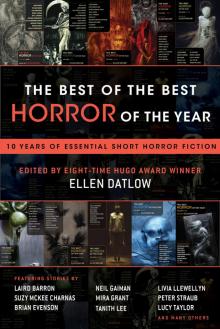 The Best of the Best Horror of the Year
The Best of the Best Horror of the Year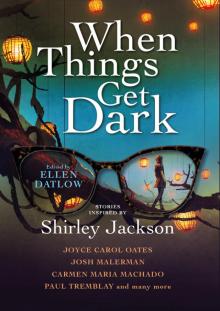 When Things Get Dark
When Things Get Dark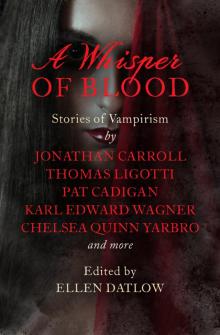 A Whisper of Blood
A Whisper of Blood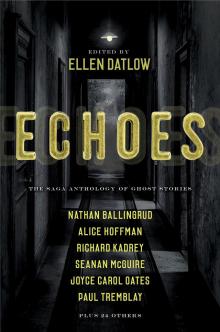 Echoes
Echoes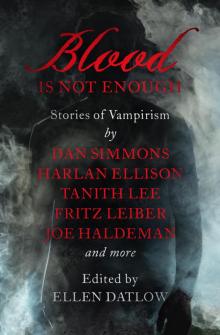 Blood Is Not Enough
Blood Is Not Enough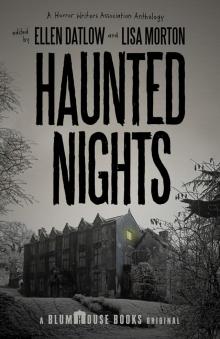 Haunted Nights
Haunted Nights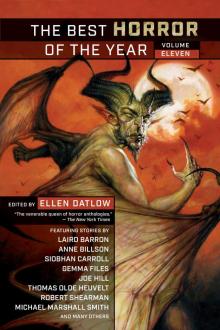 The Best Horror of the Year Volume Eleven
The Best Horror of the Year Volume Eleven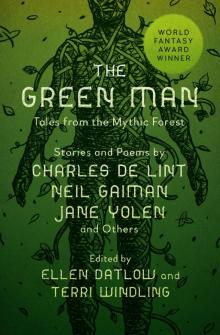 The Green Man
The Green Man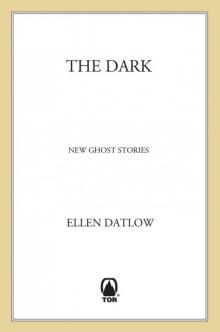 The Dark
The Dark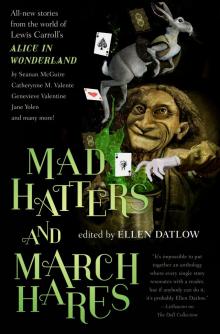 Mad Hatters and March Hares
Mad Hatters and March Hares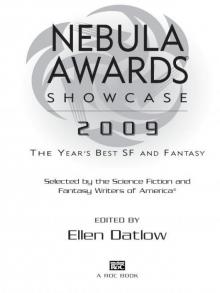 Nebula Awards Showcase 2009
Nebula Awards Showcase 2009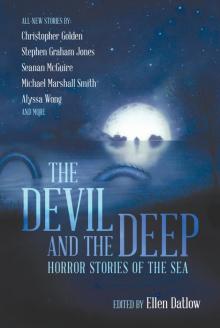 The Devil and the Deep
The Devil and the Deep